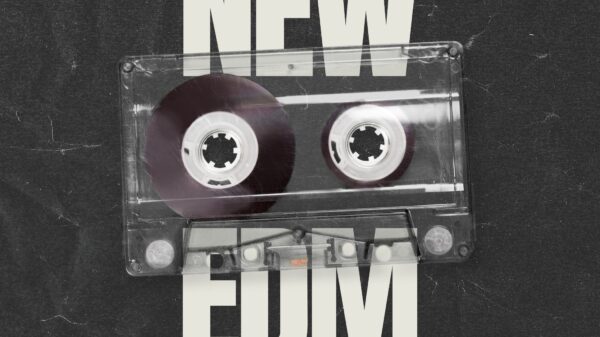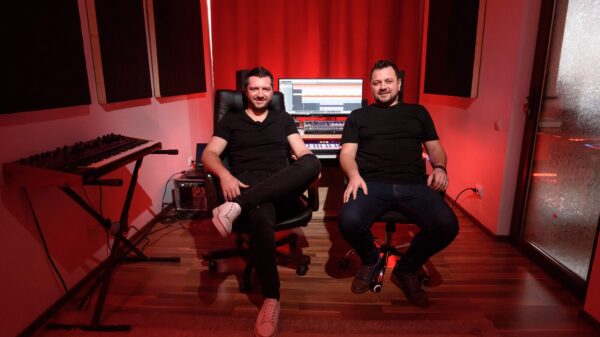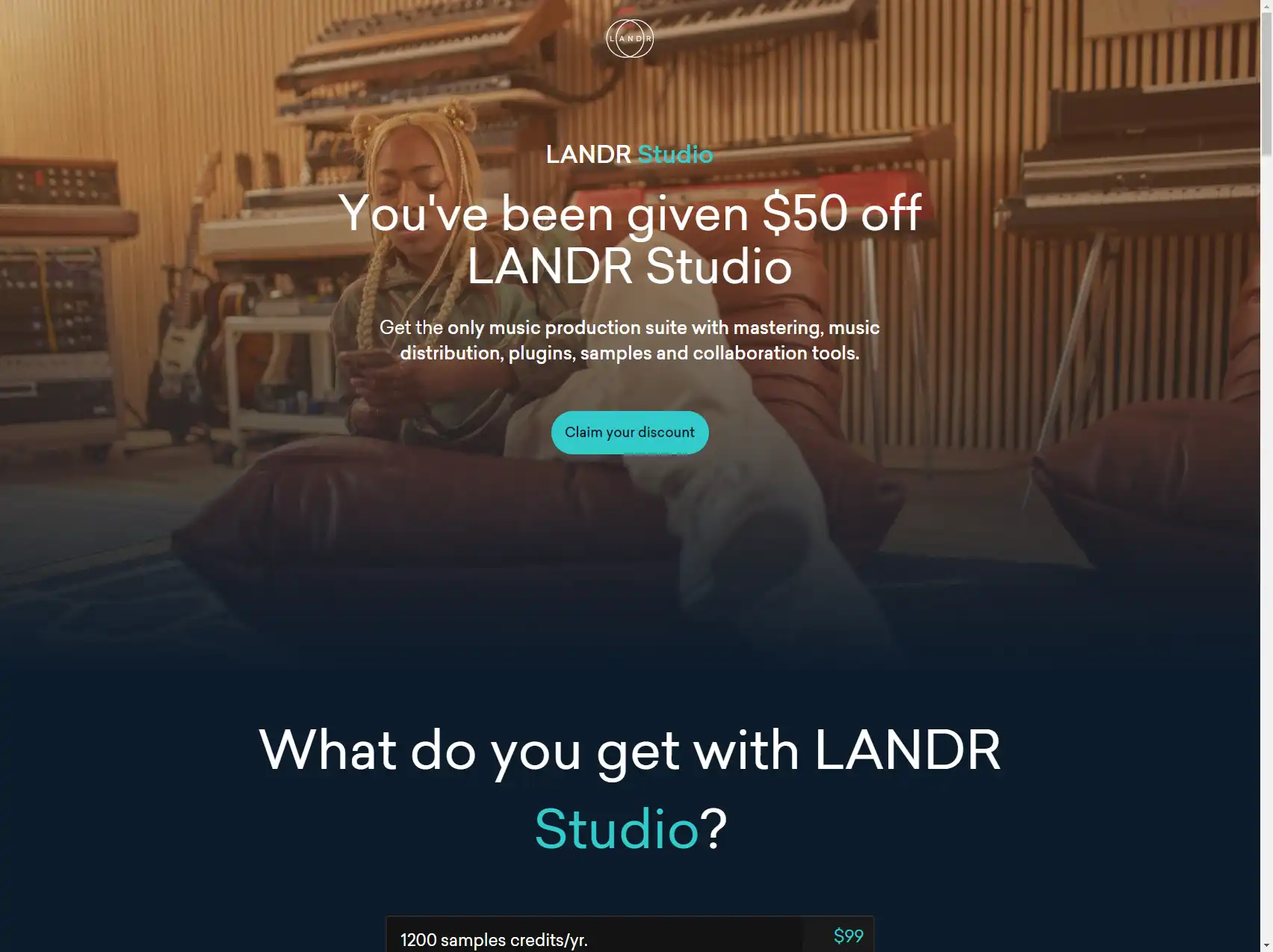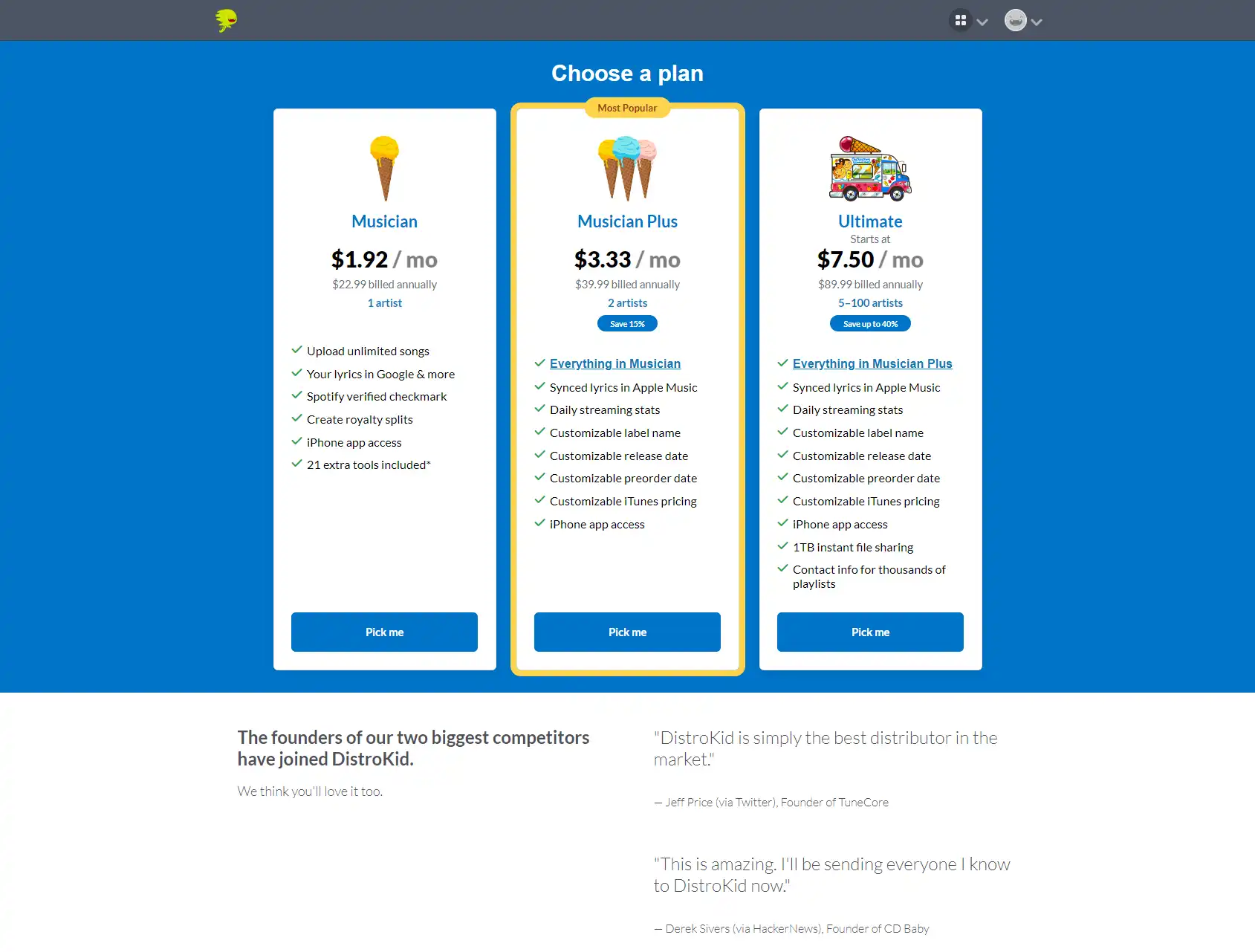Music distribution services like LANDR and DistroKid allow independent artists to get their music onto major streaming platforms like Spotify, Apple Music, and more. Choosing the right distributor is an important decision that can impact how widely your music reaches listeners. This article compares LANDR and DistroKid to help you decide which is better suited for your needs as an independent musician.

Overview of LANDR and DistroKid
LANDR
Get the only music production suite with mastering, music distribution, plugins, samples and collaboration tool
LANDR is an online music distribution and mastering service founded in 2014. In addition to distribution, LANDR offers AI-powered mastering to help optimize sound quality.
Key features of LANDR include:
- Distribution to all major streaming platforms and stores like Spotify, Apple Music, Amazon Music, Tidal, Pandora, YouTube Music, Instagram Stories and more.
- Automated online mastering powered by artificial intelligence.
- Detailed analytics dashboard to track your release's performance.
- Keep 100% of royalties.
- Pricing starts at $19 per year for a single release.
DistroKid
DistroKid has made a significant impact in the music distribution scene. It's known for its straightforward approach, allowing artists to release unlimited tracks for a fixed annual fee.
DistroKid is one of the most popular digital music distributors, founded in 2013. The platform focuses solely on music distribution without offering other services like mastering.
Key features of DistroKid include:
- Distribution to all major streaming platforms and stores.
- Option to release unlimited singles and albums for one annual fee.
- Detailed analytics and earnings reports.
- You keep 100% of royalties.
- Cheaper overall pricing, starting at $19.99 per year for unlimited releases.
Comparing Distribution and Royalties
The core service offered by both LANDR and DistroKid is music distribution to all major digital stores and streaming platforms. Both allow you to keep 100% of royalties earned from your music.
However, DistroKid has two key advantages when it comes to distribution:
Unlimited releases: With DistroKid's $19.99 annual plan, you can release unlimited singles and albums. LANDR charges per release, with singles starting at $19 each.
Faster distribution: DistroKid is known for its rapid release turnaround times, often delivering music to stores within 24 hours. LANDR can take a few days longer.
So if you plan to release a high volume of music frequently, DistroKid offers better value for money. But LANDR may be preferable if you only release occasionally.
Sound Quality and Mastering
A key difference between the two services is that LANDR provides AI-powered online audio mastering.
LANDR's algorithms analyze your music and apply processing like equalization and compression to optimize the sound. It allows you to “set and forget” – mastering is handled automatically.
DistroKid itself does not offer any mastering features. However, you can separately master your tracks using other software or online services before distributing through DistroKid.
LANDR's automated mastering can save time and ensure your tracks are release-ready. But experienced producers may prefer the control of mastering themselves using other tools.
Analytics and Royalty Reporting
Both LANDR and DistroKid provide analytics to help you track your release's performance across different platforms.
DistroKid offers more detailed statistics and earnings reports. You can filter by streaming service, time period, geographic location, and more.
LANDR's analytics are more basic – you can view totals for streams, downloads, revenue, etc. But the data is less granular.
For royalty reporting, DistroKid again provides more in-depth sales and earnings data. Royalty payments from both services are deposited directly into your bank account.
So if you want powerful analytics and reporting, DistroKid has the edge over LANDR.
Pricing and Plans
DistroKid's pricing is simpler and more affordable overall:
- $19.99 per year for unlimited single and album releases.
- $35.99 per year for the “Musician Plus” plan with extras like detailed analytics.
LANDR charges per release:
- $19 for a single release.
- $10 for each additional single.
- $39 for an album release.
- $10 for each additional album.
Plus LANDR offers monthly plans:
- $9 per month for 1 release.
- $19 per month for unlimited releases.
So if you're on a tight budget and release frequently, DistroKid offers better value as you're not limited by number of releases.
But if you release sporadically, LANDR's pay per release model may cost less. Their monthly plans also offer flexibility.
Additional LANDR Features
Beyond distribution and mastering, LANDR provides a few extra features:
Collaboration tools: Allow you to invite musicians into a “workspace” to share tracks and give feedback. Helpful for bands or working with producers.
Sample clearance: LANDR offers assistance with legally clearing any samples used in your tracks.
Promotion: You can pay extra for LANDR to pitch your release to playlists, blogs, and other promotion channels.
DistroKid itself does not offer collaboration tools, sample clearance, or promotion. So these are useful bonuses provided by LANDR's platform. But not dealbreakers if you don't need them.
Ease of Use
Both LANDR and DistroKid make it simple to upload tracks and deliver them to streaming services. They have similar workflows:
- Create an account
- Upload your finished tracks and artwork
- Enter release info like title, genre, etc.
- Review and publish
However, LANDR may have a slight learning curve if you want to take full advantage of its mastering capabilities. The AI mastering involves choosing presets and tweaking settings.
Whereas DistroKid keeps it dead simple – just upload your pre-mastered tracks.
But overall, both are easy to use even for beginners. Detailed instructions and support are provided.
Summary of Key Differences
Distribution and royalties: DistroKid offers unlimited releases and faster turnaround. Both let you keep 100% royalties.
Mastering: LANDR provides automated online mastering. DistroKid does not offer mastering.
Analytics: DistroKid has more powerful statistics and reporting.
Pricing: DistroKid better value for frequent releases. LANDR can be cheaper for occasional releases.
Additional features: LANDR offers collaboration, sample clearance, promotion options.
Ease of use: Both very simple to upload and release music.
Which Should You Choose?
So which distributor is right for your needs? Here are some factors to consider:
Go with LANDR if you want:
- Automated mastering to save time
- Collaborative features
- Sample clearance assistance
- Occasional release schedule
Go with DistroKid if you want:
- Unlimited distribution for one flat fee
- Faster time to streaming services
- More powerful analytics and reporting
- Simple focus on distribution
- To release frequently
Both are excellent modern distributors that get your music heard widely. Consider which features best align with your plans as an independent artist. You can always start with one service and switch later if needed.
Frequently Asked Questions
Can I switch distributors later?
Yes, you can change distributors whenever you like, even between releases if needed. Just be sure previous releases are taken down before switching to avoid duplicates.
Can I use both LANDR and DistroKid?
You can use both services simultaneously if you wish. Many artists use different distributors for different projects or singles vs albums. Just be cautious about duplicate releases.
What about copyrights and licensing?
You maintain full ownership of all your copyrights when distributing with either service. The distributors handle required licensing to digital streaming platforms and stores on your behalf.
How do the services get paid?
LANDR and DistroKid take a small commission from your royalties, usually 10-15%. The rest goes to you. They make revenue based on volume of releases, not by taking your royalties.
How do I withdraw earnings?
Both services pay out directly to your bank account on a monthly or quarterly basis once earnings exceed the set threshold, typically $10-20.
Can I leave music up permanently?
Yes, you can keep releases distributed indefinitely on both services. If you later unpublish, the music will gradually be removed from the platforms.
Can I switch to a record label later?
Yes, if you eventually sign to a record label, you can easily transition your catalog over by changing the distributor affiliated with your releases.
Conclusion
LANDR and DistroKid both provide powerful distribution, allowing independent musicians to access the world's top digital music platforms. Consider your budget, release plans, and need for extras like mastering to decide which option best suits your needs. Both services make it easier than ever for artists to share their music with listeners worldwide.

















